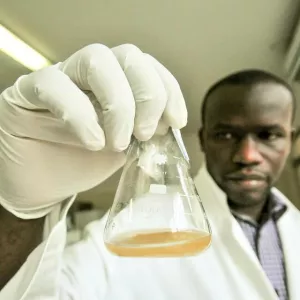Unraveling the genome: Sequencing with MinION in common bean research
Scientists in Uganda are using the MinION portable sequencer to study common bean genomics, aiming to improve breeding and adapt to pests, diseases and the impacts of climate change. This research, in collaboration with partners across East Africa, seeks to enhance food security and bean production. Deoxyribonucleic acid (DNA) and ribonucleic acid (RNA) are the fundamental molecules present in all living

Unraveling the genome: Sequencing with MinION in common bean research
Scientists in Uganda are using the MinION portable sequencer to study common bean genomics, aiming to improve breeding and adapt to pests, diseases and the impacts of climate change. This research, in collaboration with partners across East Africa, seeks to enhance food security and bean production.
Deoxyribonucleic acid (DNA) and ribonucleic acid (RNA) are the fundamental molecules present in all living organisms that control all hereditary characteristics of cells. While DNA serves as the genetic blueprint of life, encoding the instructions necessary for the growth, development and functioning of every cell, RNA acts as a messenger, carrying those instructions from DNA to guide the synthesis of proteins, which are crucial for various cellular processes. Sequencing these molecules has become a powerful tool for answering a range of biological questions, from identifying pathogens to understanding genetic disease risks and uncovering the evolutionary history of organisms.
One of the most exciting advancements in sequencing technology is the MinION, a cutting-edge device developed by Oxford Nanopore. Unlike traditional sequencing methods that require large and expensive laboratory equipment, the MinION is portable and compact, making it accessible to a broader range of researchers and institutions. This device uses a flow cell containing an array of nanopores — tiny holes embedded in an electro-resistant membrane. Each nanopore is linked to a channel and sensor chip, which measures the electric current that flows through the pore. As DNA or RNA molecules pass through these nanopores, they disrupt the current, creating a unique ‘squiggle’ pattern. These patterns are then decoded in real-time using sophisticated basecalling algorithms to reveal the precise sequence of genetic material.

